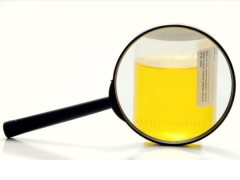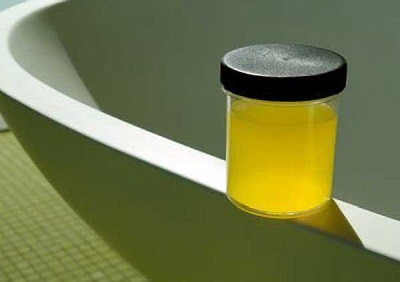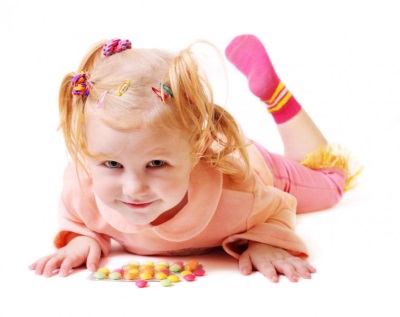Urine salts in a child
In childhood, urine tests have to be taken more than once, and changes in the indicators alarm both parents and pediatricians. What can salts revealed in children's urine tell, why do they fall into the urine of a child and what are they like?
What is it?
With the urine from the child's body, various substances are released, including salt. Often they are dissolved and stand out in small quantities.
Excess salt in the urine of the child is dangerous for the risk of formation of stones in the urinary tract, as well as inflammatory diseases (crystals can irritate the mucous membrane). When there is a lot of salt and they crystallize, it is possible to notice the salt in the urine of the baby without testing. In this case turbid urine.
Norm
AT general urine analysis salts identified in the sample are indicated by plus to one to four. The designation “+” or “++” opposite to any kind of salts is considered a variant of the norm, if such a situation was single. If salts are detected in several analyzes of the urine of the child, then one should look for the causes of such changes.
Have baby
If the baby is nursing, then salts may appear with the impaired nutrition of the nursing mother, for example, if the mother has eaten a lot of citrus fruits, mushrooms, chocolate, legumes and other products. The cause of salts in the urine of the baby can also be kidney disease and inflammation of the bladder. To exclude them, the child is sent to the ultrasound of the organs of the excretory system.
Kinds
All salts that can be detected in children's urine are divided into the following types:
- Oxalate. They are found in the urine more often than other types of salts. The presence of this type of salts is characteristic of the disturbance of metabolic processes associated with oxalic acid. Oxalates can appear in inflammation of the tissues of the kidneys or intestines, diabetes, poisoning, as well as in urolithiasis. In children, products rich in oxalic acid, which are consumed in excess, often lead to their appearance in the urine.
- Urats. So called uric acid salts. This kind of salt stains the urine of the child in a reddish-brick color and indicates a violation of the exchange of purines. These salts can get into the urine after great physical exertion, due to dehydration, fever, diarrhea, eating excess meat, mushrooms, offal, fish.
- Phosphates. The presence of these salts is characteristic of alkaline urine. This type of salt is found in children's urine with excessive consumption of products containing phosphorus. Also, phosphates in larger quantities are determined in the urine, which stood for a long time before the analysis. Among the pathological factors that cause the formation of phosphates in the urine are called cystitis, bouts of vomiting, increased body temperature, and hyperparathyroidism.
- Urea ammonium. Its crystals are excreted in the urine when a child has urolithiasis or a urinary acidic infarction.
- Salts of hippuric acid. Can be detected in the urine analysis for liver diseases, excessive consumption of plant products, long-term use of antipyretics, diabetes, kidney stone formation.
- Calcium sulfate. This kind of salt can be detected in diabetes mellitus, and also happens with excessive use cowberry, blackberries, blueberries, apricots and melons.
The reasons
The main factors causing an increase in excretion of salts with urine are:
- Eating disorders.
- Congenital kidney disease.
- Chronic diseases.
- Problems with metabolic processes.
- Disorders of the excretory system.
- Bacterial infections of the urinary tract.
- Dehydration.
Diet
Nutritional characteristics in identifying salts in the urine of a child will be determined by the type of salts. In each case, the recommended diet will be different.
- With an increase in the number of oxalates urine is recommended to drink more, add cereals, cabbage, potatoes, seafood to the diet, as well as take vitamins of group B. The menu excludes spinach, chocolate, beet and celery dishes, sorrel, parsley, broths. It should also limit food rich ascorbic acid.
- With an increase in the number of urats You should also consume plenty of fluids and use cereals, fruits, eggs, baked goods, vegetables, and dairy products as a basis. From the menu will have to exclude meat, coffee and strong brewed tea, offal, meat and fish broths, oily fish, chocolate.
- With elevated phosphate levels should reduce the consumption of cottage cheese, cheese, sour cream, fatty fish, eggs, caviar, fatty yogurts.
Drug treatment
With a very high content of a certain type of salts in the urine of the baby, the doctor may prescribe drugs, for example:
- Magnesium oxide, vitamin B6, vitamin A and vitamin E help to reduce the level of oxalates.
- To reduce the level of urats, you can use drugs that affect metabolic processes.
- To reduce the amount of phosphates emitted by taking drugs that reduce the production of gastric juice.
Prevention
So that there is no excess salt in the children's urine, it is first of all important to pay attention to the nutrition of the baby. It must be balanced and complete, with the content of vitamins necessary for a child by age. Products that provoke the formation of salts in the urine should be given in a small amount - not more than the norms recommended by pediatricians.
Since the occurrence of salts often provokes dehydration, it is important to prevent the development of such a condition. If the child has been in hot conditions for a long time, ran, got sick with diarrhea, fever or vomiting, it is necessary to fill him with water in time.















